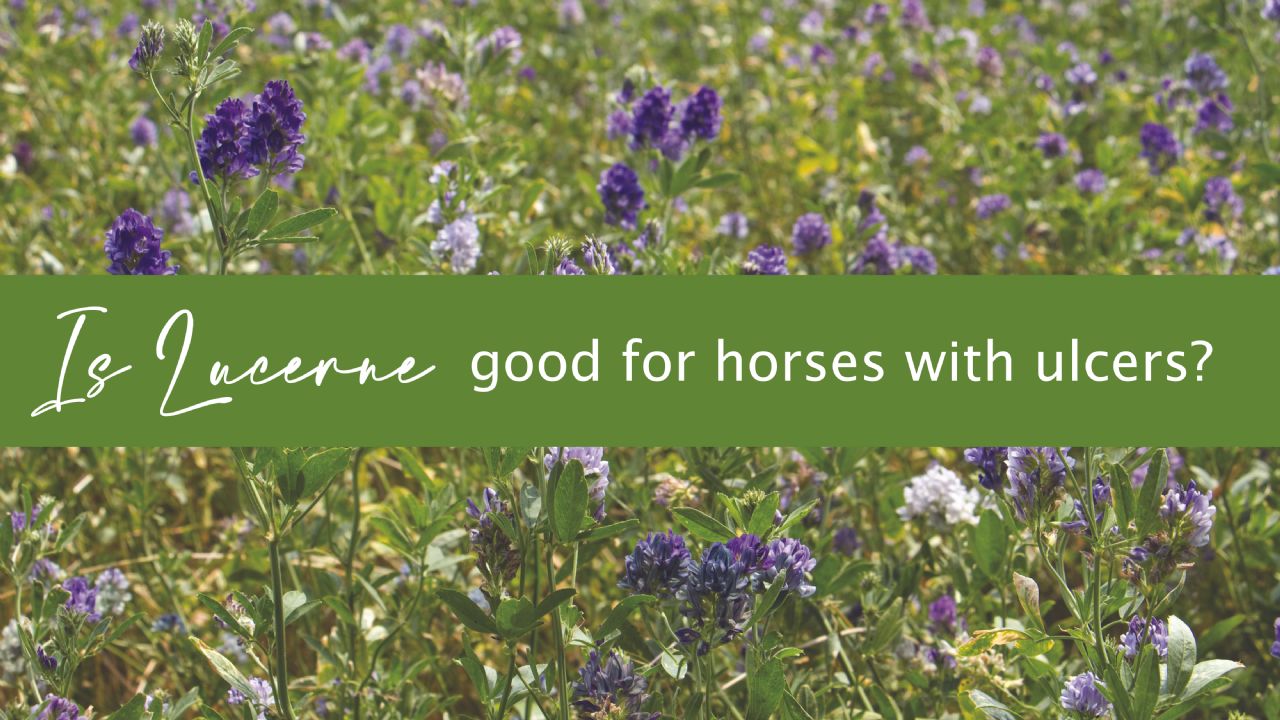Why do we recommend feeding horses from ground level?
How does the horse's jaw work? What happens if horses eat above ground level? Read the article to learn more...

Lucerne (known as alfalfa in America) is an amazing forage, known in different languages as ‘Prince of Feeds’ and ‘Best of the Best’. Lucerne has been grown for horses for around 5,000 years so has stood the test of time and there are many benefits of feeding lucerne to horses, but in particular those prone to gastric ulcers…
When seeking advice for a horse with Equine Gastric Ulcer Syndrome (EGUS) we would suggest a lucerne feed for the reasons listed above. Lucerne is known as a natural buffer of acid whilst providing high-quality protein to support horses at all stages of life from young, growing horses to adult horses in work through to veterans needing help maintaining muscle tone. Its reliably low sugar and starch level also makes it highly appropriate for horses with metabolic issues or that become hot-headed when fed starchy feeds - and starchy feeds should of course be avoided for those prone to stomach ulcers.
At Simple System we carefully produce lucerne horse feeds with distinct nutritional profiles; our Organic Lucie Stalks and Lucie Fibre Cubes are some of the lowest calorie and lowest sugar and starch feeds we offer, well suited to the good doing or overweight horse that still needs quality protein but not to excess. At the other end of the scale, for those who are poorer doing or prone to weight loss, we have the highly nutritious Build & Shine and Organic Lucie Pellets. As they tend to sit somewhere in the middle, LucieChop and Lucie Nuts are excellent base feeds for the multi-horse owner as they are nutritious enough to support those in work but also suitable sugar and starch wise for any Native type companion ponies!
How you incorporate lucerne into your horse’s diet may depend on a variety of factors including nutritional requirements but also the preferred or necessary physical form. Lucerne chops such as LucieChop or Build & Shine, encourage chewing and additional saliva generation. Saliva actively neutralises acid, so anything to increase chewing is beneficial, provided the horse has good dentition.
For those that struggle dentally or if you prefer to feed a mash, soaked lucerne pellets, like Lucie Nuts and Organic Lucie Pellets, are soft and easily digested while the increased fluid intake will help dilute stomach acid.
For horses with gastric ulcers, it is highly important to minimise the risk factors, one of which is working on an empty stomach. It is therefore strongly recommended to provide a feed – not a small amount but a full scoop of dampened lucerne chop or 0.5kg of soaked pellets – directly before exercise. This is just not just for horses in intensive exercise either and is suggested even for those in light work. This is because the horse feels hungry after an hour without food which can impact concentration but after two hours without food the build up of acid becomes uncomfortable. Working on an empty stomach makes it more likely gastric acid will splash the un-protected upper portion of the stomach which will increase the risk of gastric ulcers in horses.
In some parts of the UK and certainly elsewhere in the world, it may even be possible to source lucerne hay or a lucerne and grass hay combination. This can be highly useful for those stabled for long periods by increasing their level of intake of this acid buffering forage. It is however worth noting that due to its mineral richness, we would suggest that no more than 1% of the horse’s ideal bodyweight be fed as lucerne per day. If lucerne hay is not readily available and your horse has good dentition, Lucie Brix make a great addition and come in easy to portion blocks of around 1 kilogram – they also store conveniently and compactly for use at stay away shows.
Whilst not conclusive, the symptoms of ulcers in horses can include becoming sensitive to touch or biting when being rugged, brushed or tacked up, a reluctance to work off the leg or to pick up canter, bucking or swishing the tail when ridden, weight-loss, inappetence and a dull coat. Some horses may even be completely asymptomatic and seem very well in themselves with EGUS found incidentally.
If you have any suspicion your horse may be suffering from gastric ulcers, please speak to your vet first but you are welcome to discuss feeding your ulcer prone horse please contact our Feed Line on 01728 604 008. Alternatively, complete our online advice request form here.
How does the horse's jaw work? What happens if horses eat above ground level? Read the article to learn more...
We're thrilled to be adding an exiting new event to the calendar for 2026!
Horses’ teeth change throughout their lives - they are continually growing and continually wearing, as they chew and grind their grazing and forage.